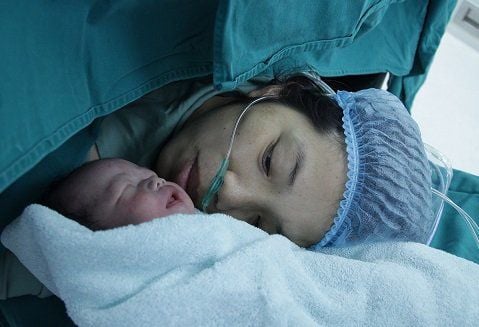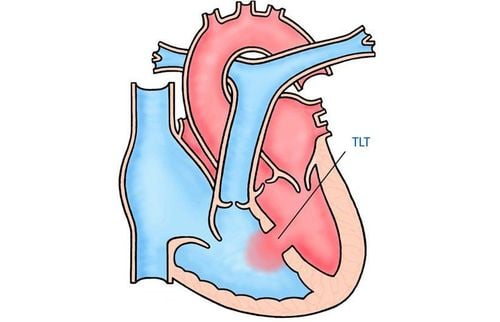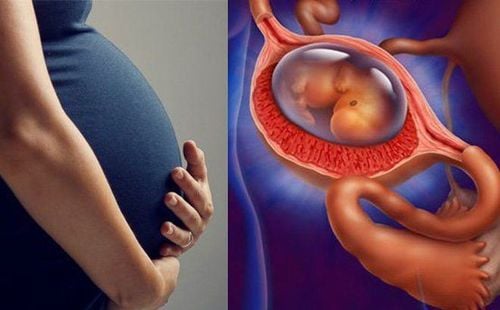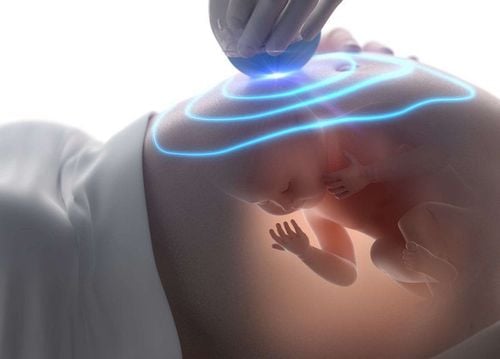This is an automatically translated article.
The article was professionally consulted with Master, Doctor Nguyen Thi Hong On - Obstetrician and Gynecologist - Department of Obstetrics and Gynecology - Vinmec Phu Quoc International General Hospital.A reasonable and scientific diet during pregnancy plays a very important role in ensuring the health of both mother and baby. However, in addition to foods that need to be supplemented, pregnant women also need to avoid certain foods, because these can be the cause of miscarriage, stillbirth. So what should pregnant women not eat during pregnancy?
1. What should pregnant women not eat during the first 3 months of pregnancy?
The first 3 months of pregnancy is the most important period of the fetus, because this is the period when the baby begins to form the organs of the nervous system. Therefore, the nutrition in the first 3 months of pregnancy is a decisive factor for the weight and development of the baby later. Besides, in the first 3 months of pregnancy, the mother has to face many dangerous conditions such as miscarriage, stillbirth, so special attention should be paid to the diet during this period.Accordingly, to answer the question of what not to eat during the first 3 months of pregnancy, doctors recommend that pregnant women should not eat the following foods:
Sprouts: sprouts such as bean sprouts always exist. bacteria in the seeds before the sprouts grow, so pregnant women absolutely should not eat them raw (can be eaten if cooked). If used intentionally, bacteria that enter the body can cause malformations for the fetus. Pickled foods: salted foods such as pickles, salted eggplants, etc. are often left to sour fermentation under the action of some microorganisms. During the stage of microorganisms converting nitrate in raw materials into nitrite, the nitrite content increases, which is very harmful to the body. Seafood: Seafood contains a lot of protein, but some fish such as king mackerel, cod, tuna, swordfish, tilefish,..., the older and older the fish, the higher the concentration of mercury. bank higher. So, to answer the question of what not to eat during the first 3 months of pregnancy, the answer is that pregnant women should not eat this fish. Beverages: herbal teas, carbonated drinks, alcoholic beverages, coffee... not only affect health but also have the risk of causing birth defects for the fetus, increasing the risk of miscarriage. In addition to the above foods, some vegetables such as: spinach, laksa leaves, beets, ... are all foods that should not be eaten during the first 3 months of pregnancy to prevent the risk of miscarriage. These foods contain substances that stimulate uterine contractions, increasing the risk of miscarriage for mothers.

2. What should not eat during the last 6 months of pregnancy?
When the fetus has gradually stabilized, in the last 6 months of pregnancy will focus on weight development. Besides, by the 4th month, pregnant women have gradually reduced the symptoms of morning sickness, so they will have a better appetite and cravings for snacks. Therefore, in the last 6 months, pregnant women need to have a reasonable diet to prevent excessive weight gain, blood sugar disorders, high blood pressure causing preeclampsia. Some foods pregnant women should not eat during pregnancy include:2.1. Sweet things
During pregnancy, the kidney's ability to excrete glucose decreases. If you eat a lot of sweets, it will make your blood sugar rise, your kidneys will work overload and are not good for your health. In addition, some studies suggest that too much sugar will weaken the body's immunity, leading to a reduced resistance to diseases and viral infections. However, still use a moderate amount according to the daily needs of the body.Trắc nghiệm: Chế độ dinh dưỡng 3 tháng đầu thai kỳ của mẹ bầu như thế nào?
3 tháng đầu được coi là giai đoạn phát triển quan trọng nhất của thai nhi. Để phát triển toàn diện, thai nhi cần được cung cấp đầy đủ dưỡng chất, đặc biệt là các vi chất cần thiết. Làm bài trắc nghiệm dưới đây sẽ giúp bạn có thêm kiến thức về chế độ dinh dưỡng trong 3 tháng đầu thai kỳ.The following content is prepared under supervision of Bác sĩ chuyên khoa I, Lê Hồng Liên , Sản phụ khoa , Khoa Sản phụ khoa - Bệnh viện Đa khoa Quốc tế Vinmec Central Park
2.2. Food is too salty
The prevalence of hypertension is related to daily salt intake. Therefore, if pregnant women eat foods that are too salty, they will have a high risk of developing high blood pressure, which is also one of the causes of pregnancy toxicity in the last 3 months of pregnancy. To ensure health during pregnancy, pregnant women should eat about 6g of salt/day.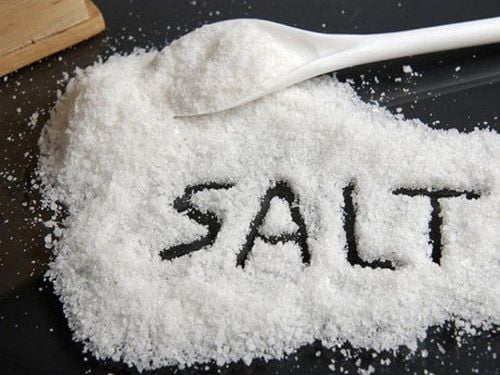
2.3. Fish with high levels of mercury
Mackerel, tuna, canned fish, ... are foods containing high levels of mercury. If eaten regularly will cause mercury to accumulate in the body, causing damage to the nervous system and the development of the fetus.2.4. Types of raw fish meat and rare
Beef steak, sushi, raw fish meat all contain bacteria such as salmonella, toxoplasmosis, coliform, ... causing poisoning.2.5. Grilled meat, bacon
These are deliciously flavored foods that are prepared with charcoal or fuel for grilling. However, when burning coal, it will create a toxic substance that can contaminate food and potentially cause cancer. Therefore, pregnant women should limit eating grilled foods to ensure the health of both mother and baby.
2.6. Processed meats
Processed foods such as cold cuts, ham, sausages, etc. are all at risk of containing listeria bacteria. Pregnant women are at increased risk of miscarriage when infected with listeria bacteria. Therefore, pregnant women should not eat these foods, if you want to change your taste, you need to process and cook them thoroughly.SEE ALSO: Nutrition and menu for pregnant women during pregnancy so that the baby is healthy and the mother does not gain weight
2.7. Animal liver
Animal liver is a food rich in iron and vitamin A. However, during pregnancy, pregnant women were supplemented with iron and absorbed vitamin A from multivitamins. Therefore, if you regularly eat animal liver, it will cause an excess of iron and vitamin A, causing adverse effects on the fetus, even fetal malformations.
2.8. Unpasteurized milk and dairy products
Most milk is pasteurized and is a good source of calcium and vitamin D to help babies grow well. In addition, some products that are not pasteurized, such as cheese, will contain Listeria bacteria, which can adversely affect the health of the fetus.2.9. Vegetables
Raw vegetables contain a lot of bacteria e.coli, salmonella,... are at risk of causing poisoning. Therefore, pregnant women should avoid these vegetables. In addition, spinach also contains Papaverin, which relaxes smooth muscle, lowers blood pressure, and relieves pain. If pregnant women eat a lot of these vegetables, it will cause the cervix to contract and increase the risk of miscarriage.Bitter melon contains ingredients Monodicine, Quinine,... stimulates uterine contractions, increasing the risk of miscarriage. Therefore, pregnant women should avoid eating bitter melon.
In addition to the above foods, fresh bamboo shoots are also a food that pregnant women should avoid, because they contain cyanide, a substance that is dangerous to the body. Pregnant women can be poisoned if this poison is not removed before eating. Symptoms may appear such as vomiting, headache, shortness of breath, ... severe cases can lead to death.
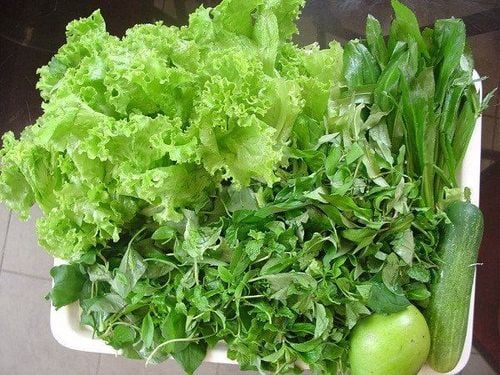
2.10. Some kind of fruit
Although fruits provide a lot of vitamins and minerals for the body, some fruits can affect pregnant women such as:Green papaya, pineapple: contains substances that stimulate uterine smooth muscle. active, can cause miscarriage. Longan, na: contains a lot of glucose, if pregnant women eat a lot, there is a risk of gestational diabetes and constipation. Therefore, pregnant women should limit eating fruits with high sugar content. To ensure health, pregnant mothers should maintain a reasonable diet during pregnancy to help their children develop comprehensively. Besides, pregnant women also need to note some foods that should not be eaten during pregnancy to prevent the risk of miscarriage, affecting the health of both mother and baby. In addition to regular antenatal check-ups, mothers can go to medical facilities to receive advice from nutritionists on a scientific and appropriate diet.
Not only is an address to provide knowledge and examination before planning to become a mother for women, now Vinmec International General Hospital offers a Package Maternity Care Program for pregnant women right away. from the beginning of pregnancy from the first months with a full range of antenatal check-ups, periodical 3D and 4D ultrasounds and routine tests to ensure that the mother is always healthy and the fetus develops comprehensively. In addition to regular check-ups, pregnant women will also be advised on nutrition and exercise so that the mother can gain weight reasonably while the fetus still absorbs nutrients well.
In particular, with the medical examination and treatment process at Vinmec performed by well-trained obstetricians both at home and abroad, it will soon detect obstetric diseases in the mother or abnormalities in the fetus for early examination and timely treatment.
Please dial HOTLINE for more information or register for an appointment HERE. Download MyVinmec app to make appointments faster and to manage your bookings easily.






